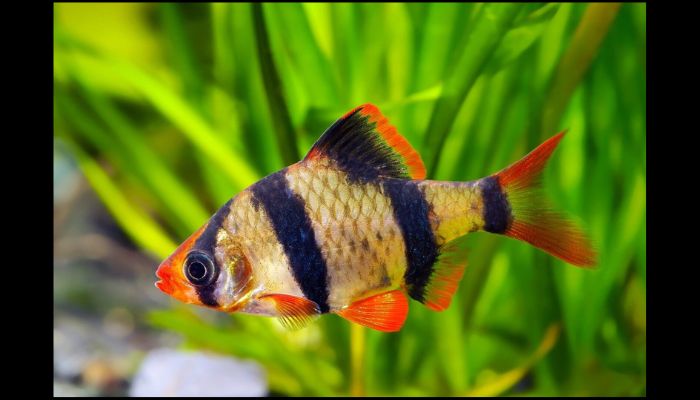If you’re diving into the world of freshwater aquariums, one question will likely pop into your head: What freshwater fish cannot live together? It’s an essential thing to consider because, just like humans, fish have personalities, preferences, and specific needs. Some fish are peaceful and social, while others are territorial or aggressive.
In this article, we’ll cover everything you need to know about fish compatibility. We’ll explore which freshwater fish are incompatible, why they can’t live together, and how to keep your tank peaceful and balanced.
Understanding Fish Compatibility: Why It Matters
Fish compatibility isn’t just about ensuring peace in your tank (though that’s a big part of it!). It’s also about maintaining the health and well-being of your aquatic pets. Incompatible fish can lead to bullying, stress, injury, and even death. By knowing which species can’t cohabitate, you can prevent these problems before they occur.
Here’s where things get tricky. Fish may look calm and serene in the store, but once you bring them home, their natural instincts kick in. Some may try to claim territory, some may become bullies, and others may see smaller fish as dinner. So, which fish should you avoid pairing?
1. Betta Fish (Siamese Fighting Fish)
Bettas are beautiful, with flowing fins and vivid colors, but they are notoriously aggressive. Male bettas especially can’t stand the sight of another male in the same tank, and it’ll quickly lead to a showdown. Even females can be fin-nippers, though they tend to be a bit less combative.

Avoid pairing bettas with:
- Other male bettas
- Fish with long fins (such as guppies or fancy goldfish)
- Aggressive or fin-nipping fish (like tiger barbs)
Bettas also have difficulty living with faster, more active fish, which can stress them out or steal their food.
2. Oscar Fish
Oscars are large, carnivorous fish that love to have control over their tank. They’re highly territorial and won’t hesitate to chase, nip, or even eat smaller fish. Despite their aggression, Oscars are intelligent and can even recognize their owners, but they need tankmates who can stand up to their bold behavior.
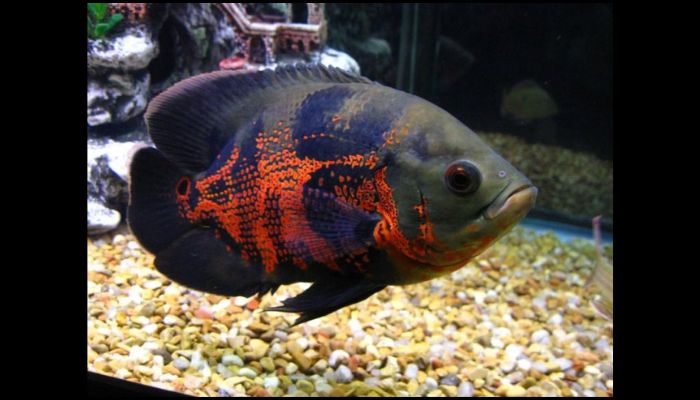
Avoid pairing Oscars with:
- Small fish (neon tetras, guppies)
- Shy or peaceful species (like gouramis or angelfish)
- Slow-moving fish that can’t compete for food
If you have an Oscar, look for larger, more robust species that can hold their own, such as other cichlids.
3. Tiger Barbs
Tiger barbs are small but feisty. They’re notorious fin-nippers and tend to harass slow or long-finned fish. Tiger barbs are also highly active and thrive in groups, so they do best when kept with other energetic fish.
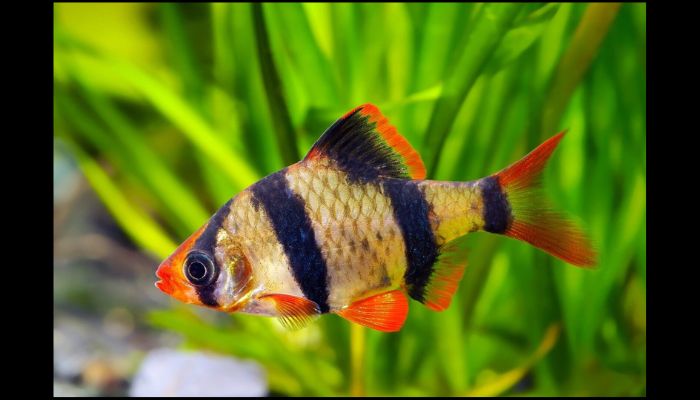
Avoid pairing tiger barbs with:
- Slow-moving fish (such as angelfish or bettas)
- Long-finned fish (like guppies or fancy goldfish)
- Shy, peaceful species (like neon tetras)
If you want to keep tiger barbs, try housing them with other fast-moving, short-finned species that can keep up with their pace.
4. Angelfish
Angelfish are graceful and elegant, but they can be territorial and somewhat aggressive, especially in smaller tanks. While they can be peaceful with the right tankmates, they’re not a good match for smaller fish or fin-nippers.

Avoid pairing angelfish with:
- Small fish (like neon tetras or guppies) – they might see them as food
- Fin-nippers (like tiger barbs)
- Other aggressive or territorial fish
Angelfish tend to do well with medium-sized, peaceful species that won’t challenge them for dominance.
5. Goldfish
Goldfish are often seen as beginner fish, but they come with their own set of challenges. For one, they produce a lot of waste, which can lead to poor water quality if the tank isn’t maintained properly. They also prefer cooler water temperatures, making them incompatible with many tropical fish.
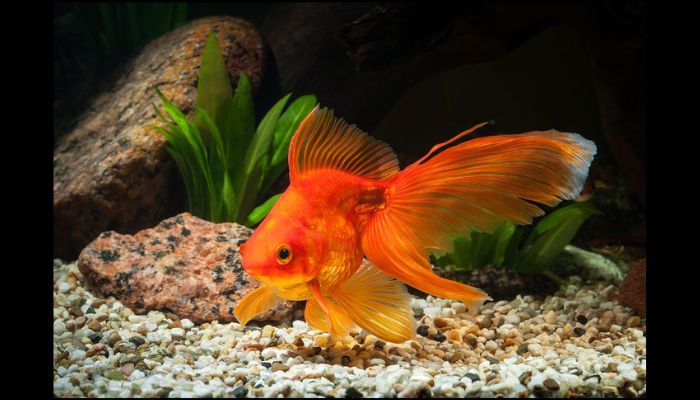
Avoid pairing goldfish with:
- Tropical fish (like tetras, cichlids, or bettas)
- Fin-nipping species (like tiger barbs)
- Fish that prefer warmer waters
Goldfish do best in species-specific tanks or with other cold-water fish like white cloud minnows.
6. Cichlids (Various Types)
Cichlids come in a variety of species, and while some can be kept with other fish, many are highly territorial and aggressive. African cichlids, in particular, are known for their feisty behavior and can’t be housed with peaceful fish.

Avoid pairing cichlids with:
- Peaceful fish (like gouramis or tetras)
- Small fish that they can easily dominate or eat
- Other territorial species (such as bettas or angelfish)
Cichlids tend to do best in cichlid-only tanks, where they can establish their territories without causing chaos.
7. Red-Tailed Sharks
Red-tailed sharks are sleek, striking, and aggressive. They’re highly territorial and will chase other fish around the tank, particularly if they feel threatened or if another fish invades their space.
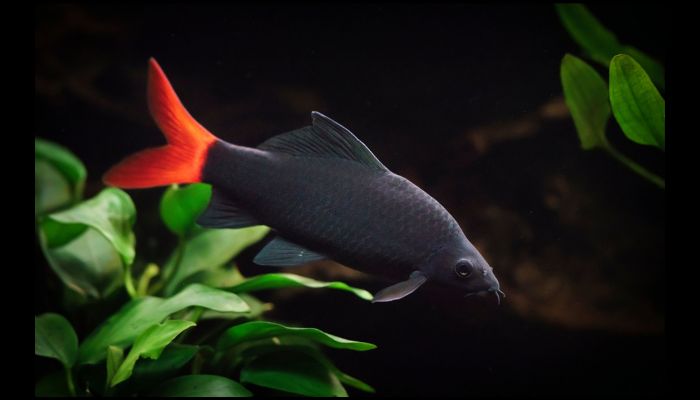
Avoid pairing red-tailed sharks with:
- Other bottom-dwellers (like catfish or loaches)
- Shy or peaceful fish (like neon tetras or guppies)
- Other territorial fish
If you’re determined to keep a red-tailed shark, provide them with plenty of hiding places and tankmates that can tolerate their aggressive behavior.
8. Guppies
Guppies are small, colorful, and peaceful, which makes them an easy target for more aggressive species. While they can thrive in community tanks, guppies should only be kept with other peaceful, small fish.
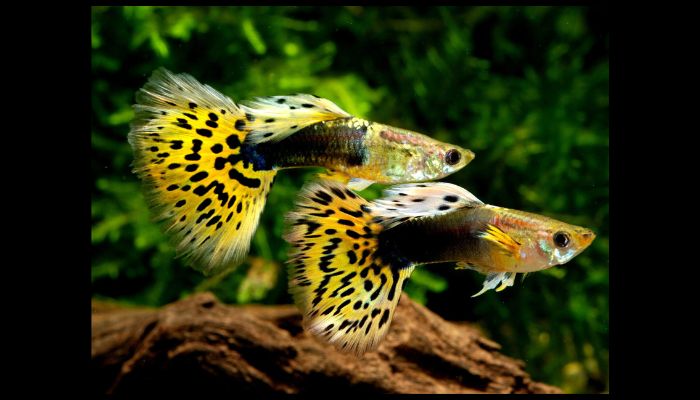
Avoid pairing guppies with:
- Aggressive or territorial fish (like cichlids or bettas)
- Fin-nipping species (such as tiger barbs)
- Large, predatory fish (like Oscars)
Guppies do well in tanks with other peaceful species like mollies or platies.
9. Neon Tetras
Neon tetras are tiny, schooling fish that are best known for their bright colors. While they’re peaceful, they’re also small and can become prey for larger fish. They also stress easily and don’t handle aggressive tankmates well.

Avoid pairing neon tetras with:
- Large, predatory fish (like Oscars or angelfish)
- Aggressive or territorial species (such as cichlids or bettas)
- Fin-nipping species (like tiger barbs)
Neon tetras thrive in peaceful community tanks with other small, non-aggressive species.
10. Discus Fish
Discus are stunning, but they’re also quite sensitive and require very specific water conditions. They’re peaceful by nature, but they don’t do well with aggressive or fast-moving tankmates.
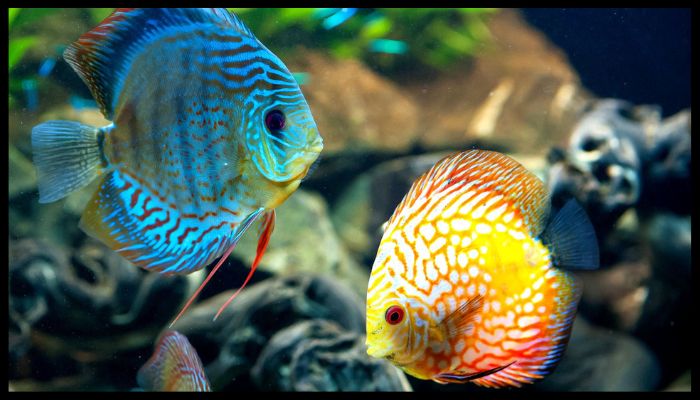
Avoid pairing discus with:
- Aggressive fish (like cichlids or bettas)
- Fast-moving fish that can outcompete them for food (like danios or barbs)
- Fish that require different water conditions
Discus are best suited to calm, peaceful tanks with species that share similar water requirements.
Tips for Building a Peaceful Tank
Now that you know which freshwater fish cannot live together, here are some practical tips for creating a harmonious tank:
- Research fish behavior: Before adding any fish to your aquarium, take the time to research their temperament, space requirements, and dietary needs. Some fish need more room to swim, while others prefer hiding places.
- Match water parameters: Make sure the fish you’re keeping share the same water temperature, pH levels, and hardness. For instance, goldfish thrive in cooler waters, while tropical fish need warmer environments.
- Avoid overcrowding: Overcrowding can lead to stress and aggression, even among peaceful species. A good rule of thumb is to provide at least one gallon of water per inch of fish.
- Provide hiding spaces: Territorial or shy fish need places to retreat. Adding caves, plants, or other décor can reduce aggression by giving fish places to claim as their own.
- Monitor for signs of stress: Keep an eye on your fish for signs of stress or aggression, such as fin damage, hiding, or rapid breathing. If you notice issues, consider rearranging the tank or separating incompatible species.
Conclusion
In summary, understanding what freshwater fish cannot live together is key to maintaining a happy, healthy aquarium. Every species has its own temperament, and some fish simply don’t get along. Whether it’s an aggressive Oscar or a fin-nipping tiger barb, knowing your fish’s compatibility will save you a lot of headaches (and heartaches).
Frequently Asked Questions (FAQs)
1. What freshwater fish cannot live together?
Some freshwater fish are notorious for their incompatibility with others. For example, bettas should never be kept with other male bettas or fin-nipping species like tiger barbs. Oscars are aggressive and can’t live with smaller or peaceful fish. Goldfish, due to their cold-water needs, are also incompatible with tropical species.
2. Why is it important to know which fish cannot live together?
Knowing which fish cannot live together helps you avoid conflicts and stress in your tank. Incompatible fish can lead to aggression, bullying, and even death. Ensuring that your fish get along will create a more peaceful and healthy environment for all.
3. Can you keep aggressive fish with peaceful fish?
Generally, it’s best to avoid keeping aggressive fish with peaceful ones. Aggressive fish, like cichlids or red-tailed sharks, can bully or even attack more docile species. Always research the temperament of your fish before combining them in the same tank.
4. How can I tell if my fish are stressed?
Signs of stress in fish include hiding more than usual, rapid gill movement, fin damage, and aggression. Stressed fish might also refuse to eat or show unusual swimming patterns. Monitoring your fish’s behavior can help you identify and address issues early.
5. What should I do if my fish are fighting?
If you notice aggression or fighting in your tank, try to provide more hiding spots and rearrange the décor to break up territories. If the problem persists, you might need to separate the aggressive fish or reconsider the tank’s inhabitants.
6. Can I mix different types of fish in a tank?
Yes, but careful planning is essential. When mixing different types of fish, ensure they have similar water requirements and that their temperaments are compatible. Research each species’ needs and behaviors before adding them to your tank.
7. How do I choose compatible fish for my tank?
When choosing fish, consider their size, temperament, and environmental needs. Look for species that have similar water requirements and that won’t outcompete each other for food or space. Always research each species to ensure they will coexist peacefully.
8. What are some peaceful fish that get along well?
Peaceful fish that generally get along well include guppies, mollies, platies, and neon tetras. These species are typically small, non-aggressive, and enjoy community tank environments. However, always double-check their compatibility with other species before adding them.
9. How many fish can I safely keep in my aquarium?
The number of fish you can keep depends on the size of your tank. A good rule of thumb is to allow one gallon of water per inch of fish. Overcrowding can lead to poor water quality and stress, so ensure your tank has enough space for each fish.
10. Can I add new fish to my existing tank?
Yes, but it’s crucial to introduce new fish slowly and carefully. Quarantine new arrivals in a separate tank first to ensure they are healthy and won’t introduce diseases. When adding new fish, monitor the tank closely for any signs of aggression or stress.
